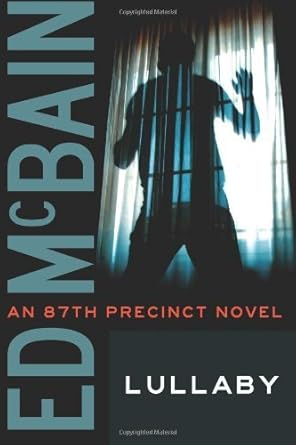
ROMANCE


Romance … is a would-be hit play about an actress in a hit play pursued by a knife-wielding stalker. Until the leading lady is stabbed outside the theater. Before the detectives of the 87th Precinct can solve that crime, the actress is stabbed again. This time for keeps.
A.D.A. Nellie Brand moves in for a murder conviction, but Carella is sure the wrong guy is taking the rap. While blond Bert Kling grills suspects ranging from the show’s producers to the leading lady’s lovely understudy, he’s falling in love with a doctor–who happens to be black. Romance is in the air. And only a very determined killer doesn’t seem to care.
When ED McBAIN (a pseudonym for author Evan Hunter) published Cop Hater, his first novel in the 87th Precinct series. Dwight Eisenhower still lived in the White House, I Love Lucy topped the Nielsen ratings, and everybody was talking about a new “hillbilly” singer named Elvis Presley. Some 39 years and 45 novels later, McBain’s busy cops are still solving murders in the imaginary (but suspiciously Manhattan-like) city of Isola. McBain’s latest effort, ROMANCE, crosscuts between two parallel stories, one a mystery involving homicide among theater folk, the other an interracial love story about a male detective at the precinct and a female police surgeon. Both narratives provide McBain with ample opportunities to do what he does best: generate brisk, compelling scenes and write some of the very best dialogue in American fiction No matter how well the 87th Precinct books have kept pace with changing times, they remain stubbornly committed to the old-fashioned verities of strong, vigorous, no-nonsense storytelling. What other American product can you think of that has remained so durable, and so consistently dependable, for nearly 40 years?
Entertainment Weekly

STEP RIGHT IN >>
Chapter 1
KLING MADE HIS CALL FROM AN OUTSIDE PHONE BECAUSE HE didn’t want to be turned down in a place as public as the squadroom. He didn’t want to risk possible derision from the men with whom he worked day and night, the men to whom he often entrusted his life. Nor did he want to make the call from anyplace at all in the station house. There were pay phones on every floor, but a police station was like a small town, and gossip traveled fast. He did not want anyone to overhear him fumbling for words in the event of a rejection. He felt that rejection was a very definite possibility.
So he stood in the pouring rain a block from the station house, at a blue plastic shell with a pay phone inside it, dialing the number he’d got from the police directory operator, and which he’d scribbled on a scrap of paper that was now getting soggy in the rain. He waited while the phone rang, once, twice, three times, four, five, and he thought She isn’t home, six. sev…
“Hello?”
Her voice startled him.
“Hello, uh, Sharon?” he said. “Chief Cooke?”
“Who’s this, please?”
Her voice impatient and sharp. Rain pelting down everywhere around him. Hang up, he thought.
“This is Bert Kling?” he said.
“Who?”
The sharpness still in her voice. But edged with puzzlement now.
“Detective Bert Kling,” he said. “We . . . uh . . . met at the hospital.”
“The hospital?”
“Earlier this week. The hostage cop shooting. Georgia Mowbry.”
“Yes?”
Trying to remember who he was. Unforgettable encounter, he guessed. Lasting impression.
“I was with Detective Burke,” he said, ready to give up. “The redheaded hostage cop. She was with Georgia when. . .”
“Oh, Yes, I remember now. How are you?”
“Fine,” he said, and then very quickly, “I’m calling to tell you how sorry I am you lost her.”
“That’s very kind of you.”
“I know I should have called earlier..”
“No, no, it’s appreciated.”
“But we were working a difficult case…”
“I quite understand.”
Georgia Mowbry had died on Wednesday night. This was now Sunday. She suddenly wondered what this was all about. She’d been reading the paper when her phone rang. Reading all about yesterday’s riot in the park. Blacks and whites rioting. Blacks and whites shooting each other, killing each other.
“So .. . uh .. . I know how difficult something like that must be,” he said. “And I … uh…just thought I’d offer my . . . uh . . . sympathy.”
“Thank you,” she said.
There was a silence.
Then:
“Uh . . . Sharon . . .”‘
“By the way, it’s Sharyn,” she said.
“Isn’t that what I’m saying?”
“You’re saying Sharon.”
“Right,” he said.
“But it’s Sharyn.”
“I know,” he said, thoroughly confused now.
“With a `y,”‘ she said.
“Oh,” he said. “Right. Thank you. I’m sorry. Sharyn, right.”
“What’s that I hear??” she asked.
“What do you mean?”
‘”That sound.”
“Sound? Oh. It must be the rain.”
“The rain? Where are you?”
“I’m calling from outside.”
“From a phone booth?”
“No, not really, it’s just one of these little shell things. What you’re hearing is the rain hitting the plastic.”
“You’re standing in the rain?”
“Well, sort of.”
“Isn’t there a phone in the squadroom?”
“Well, yes. But . . .”
She waited.
“I . . . uh . . . didn’t want anyone to hear me.”
“Why not?”
“Because I . . . I didn’t know how you’d feel about … something like this.”
“Something like what?”
“My . . . asking you to have dinner with me.”
Silence.
“Sharyn?”
“Yes?”
“Your being a chief and all,” he said. “A deputy chief.”
She blinked.
“I thought it might make a difference. That I’m just a detective/third.”
“I see.”
No mention of his blond hair or her black skin.
87th precinct books
Learn. more about selected 87th Precinct books and read the first chapter!
You can buy all 87th Precinct books now on Amazon >>


















